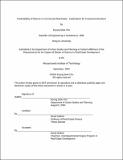Predictability of returns in commercial real estate : implications for investment decisions
Author(s)
Cho, Kyung Seok, 1969-
DownloadFull printable version (458.5Kb)
Other Contributors
Massachusetts Institute of Technology. Dept. of Urban Studies and Planning.
Advisor
David Geltner.
Terms of use
Metadata
Show full item recordAbstract
Prior studies suggest that variations of returns in all assets can be predicted to some extent. This study extends the subject of predictability of returns to commercial real estate. The main purpose of the present study is to investigate whether private real estate is predictable and the level of predictability associated with real estate return sufficient to realize superior investment performance by market timing. The study examines commercial real estate both at the aggregate level and in markets for four major property types in the United States. A rolling regression using a vector autoregressive model is employed to forecast returns and estimate the predictability of commercial real estate. Then the forecast model is used to construct simple rules regarding market timing. The classical efficient market theory suggests that there is little to be gained by timing investment, and little hope to consistently beat the market since asset prices already reflect all information available in the market. However, the fact that returns in commercial real estate are predictable raises the possibility of market timing. The potential to use a market timing strategy based on the predicted returns to achieve superior investment performance is of interest to practitioners since it suggests a more efficient method for investment portfolio allocation. The findings of the study suggest that commercial real estate returns are predictable to a certain extent and, although not statistically convincing, that the level of predictability associated with commercial real estate can be used to direct market timing decisions and achieve superior performance relative to a passive buy and hold portfolio. However, predictability of returns tends to decrease at the disaggregate property market level as the markets have smaller sample sizes and more exposure to idiosyncratic risk.
Description
Thesis (S.M.)--Massachusetts Institute of Technology, Dept. of Urban Studies and Planning, 2004. This electronic version was submitted by the student author. The certified thesis is available in the Institute Archives and Special Collections. Includes bibliographical references (leaf 68).
Date issued
2004Department
Massachusetts Institute of Technology. Department of Urban Studies and PlanningPublisher
Massachusetts Institute of Technology
Keywords
Urban Studies and Planning.